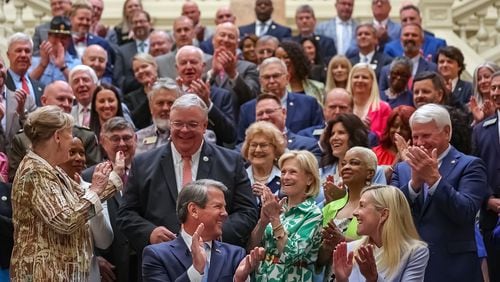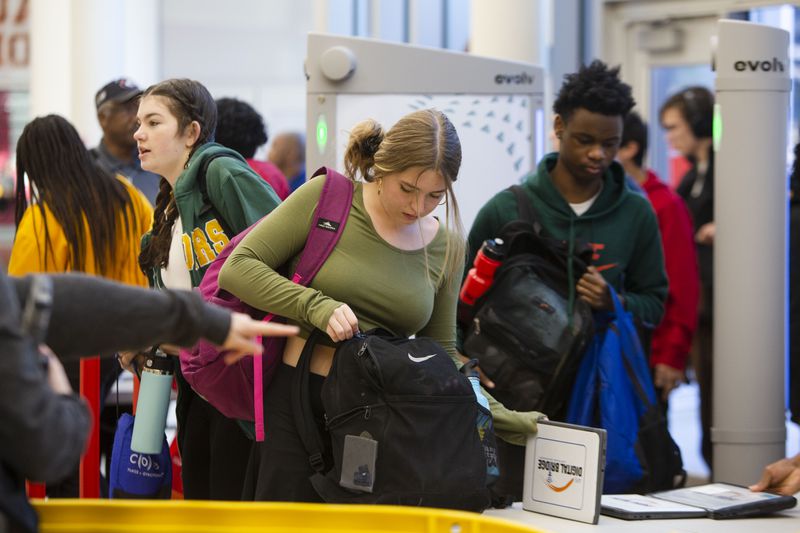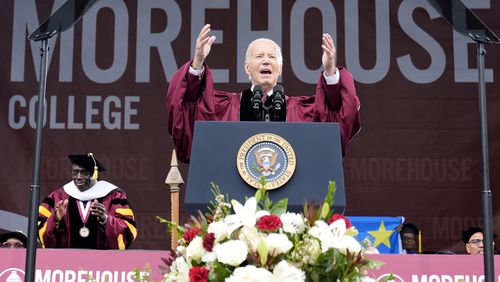As the annual Capitol bill-signing season wound down Tuesday, Gov. Brian Kemp inked a $36.1 billion state spending plan for the coming fiscal year that includes raises for 300,000 educators and state workers, plus more money for law enforcement, education and mental health programs.
The raises are included in the budget for fiscal 2025 — which begins July 1 and was approved by lawmakers on the final day of the 2024 legislative session in March.
Kemp signed the spending plan at the Capitol in front of about 50 lawmakers and state agency heads, telling those in attendance, “This yearly budget is the biggest demonstration of our priorities and the biggest tool we have to serve the people of this great state.”
State tax collections have been slow for the past year. But the state is sitting on $16 billion in “rainy day” and undesignated reserves, so Kemp and lawmakers have backed higher spending since the session began in January.
State spending has grown from about $26.6 billion in fiscal 2020, the last budget plan approved before the COVID-19 pandemic hit, as tax collections flowed in during the economic uptick that followed. Revenue stalled out in fiscal 2024, and it is not expected to gain much momentum next year.
All that matters because the money the state collects in taxes helps pay for K-12 schools, colleges, public health care, prisons, policing, business regulation, roads and a host of other services.
Under the Kemp budget plan endorsed by the House and Senate, rank-and-file workers will receive 4% increases — up to $3,000 — and teachers will get $2,500 more.
Some other employees, such as those in state law enforcement, will receive the 4% raises plus an extra $3,000.
More than $200 million extra will go to school districts to pay for transporting children to school, something local officials have requested for years, and more than $100 million will go to schools for security upgrades.
“We believe there is no more important issue than ensuring the safety and well-being of our students,” House Speaker Jon Burns, R-Newington, said before the budget signing. “We wanted to make sure they were safe when they went to school, that their parents felt safe about leaving them (at school). We want to and will keep our children safe.”
Credit: Christina Matacotta
Credit: Christina Matacotta
Both chambers backed hundreds of millions of dollars more for Medicaid, the state-federal health care program for the poor and disabled, including big money to increase payments to some medical providers.
Kemp made a last-minute addition in March to put $48.4 million more into the state’s prekindergarten program to lower class sizes, increase teacher pay, and fund capital and operational projects.
Lawmakers added $10.7 million more for security technology to block cellphone signals in state prisons. Lawmakers began funding that program earlier this year in the midyear budget in hopes of stopping rampant inmate cellphone use.
They also included an extra $6 million to provide more literacy coaches in low-performing schools and $6.3 million for reduced-priced school breakfasts and lunches for students. In addition, lawmakers included millions more for domestic violence and sexual assault centers. An additional $16.5 million will go for mental health crisis centers statewide.
After signing the budget, Kemp told reporters, “We’ve increased spending to meet our needs, but it doesn’t mean we have to spend everything we have in our rainy day fund.
“We know our economy is slowing, quite honestly, because of bad policies in Washington, D.C., and we want to be prepared for that in the future. We also want to be prepared in the future with our commitment to continue to cut taxes.”
About the Author









